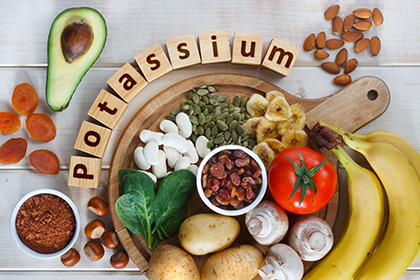hy is Potassium required for the human body?
Electrolyte balance is required for the proper functioning of the human body. Potassium, along with Sodium, Chloride and bicarbonate help regulate the electrolyte balance of our body-fluids. This in turn ensures your muscles move correctly, your body cells get the desired nutrients, and your nerves transmit signals efficiently.
What are the consequences of Potassium deficiency?
Deficiency of dietary potassium can lead to several mental and physical ailments:

Mental: Insomnia, anorexia, depression and nervous disorders
Physical: Muscular cramps, fatigue, irregular heart-beat, muscle weakness, cardiovascular problems, bloating, constipation, weight gain and arthritis
If you experience one or more of these symptoms, you should consult a Doctor immediately.
How can we determine potassium levels in the body?
A simple blood test conducted by any diagnostic or medical facility can determine your potassium levels.
When does Potassium deficiency occur?
- Some of the common conditions that can trigger a rapid fall in potassium levels are:
- Excessive alcohol consumption
- High stress
- Diarrhea and Vomiting
- Prolonged periods in women
- Excessive sweating
- Other than the above, potassium deficiency is a common symptom in Crohn’s disease, Kidney ailments, congestive heart failure, eating disorders like anorexia or bulimia, and any illness that causes frequent diarrhea and vomiting.
What happens if potassium deficiency is not treated?
If left untreated, potassium deficiency can cause hypokalemia (characterized by muscle cramps, fatigue, weakness and constipation), paralysis and potentially fatal heart arrhythmias (irregular or inconsistent heartbeat) .
Benefits of Potassium intake
Potassium supplements can help boost your cardiac health, decrease cramps, and reduce the risk of stroke, high blood pressure, cellulite (persistent deposition of fat in the skin, especially in areas such as thighs and hips) and osteoporosis.
Nutritional reasons for potassium deficiency
Excessive caffeine consumption, imbalanced diet, excessive consumption of processed foods and excess sodium intake (through salt or soda)
How to maintain potassium balance
- Potassium supplements: Daily recommended intake for adults at 4.7 mg
- Regulating sodium intake which again depends on the individual’s condition
- Avoiding junk food, fatty food and excessive carbohydrate intake
- Patients with kidney ailments must consult their nephrologist in this regard
Foods rich in potassium
Sweet potatoes, bananas, white beans, tender coconut water, apricots, prunes, nuts, tomatoes, spinach and avocados
Article by Ms. Radhika
Dietician, Kauvery Hospital

